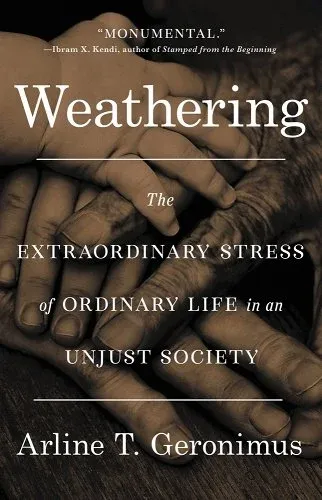Professor Arline Geronimus Has Been Talking About the Health Effects of Racism for Decades. Here’s What She Wants All of Us to Know
Thirty years ago, University of Michigan researcher and professor Arline Geronimus, PhD., shared what was considered a radical idea at the time: The chronic stress of living in a racist world was the reason for poor health outcomes in marginalized communities.
Few wanted to listen, saying poor lifestyle choices and genetics were more likely to blame. However, Geronimus charged on, publishing more than 130 papers that have bolstered her initial findings that the repeated or sustained activation of the stress response over years (and eventually decades)—what she calls “weathering”—have real, measurable consequences for health.
The proof of weathering’s detrimental effects is in the shocking health stats that continue to make news headlines. Black and Hispanic people—as well as those living in poverty—have higher rates of diabetes and high blood pressure. They experience more than twice the rate of maternal and infant mortality. And their life expectancy is significantly lower, with Native American people losing an average of 4.5 years of life expectancy, Black and Hispanic people losing an average of 3 years, and white people losing just 1.2 years in the wake of the COVID-19 pandemic.
Thankfully, Geronimus’ work is now generating widespread support. Her new book, Weathering: The Extraordinary Stress of Ordinary Life in an Unjust Society, not only outlines the findings of her decades of research but also provides actionable solutions. The Sunday Paper sat down with Geronimus to learn more about how, exactly, systemic injustice takes a physical toll on Black, brown, working-class, and poor communities—and why all of us should care.
A CONVERSATION WITH ARLINE GERONIMUS, PHD
You’ve spent your career studying the effects of social injustice on the body. Can you explain what happens on a physiological level?
For members of marginalized groups—whether they are people of color, working-class or poor whites, immigrants during years of xenophobia, LGBTQ people at times when they are being oppressed—your biological systems for evading threats or surviving threats are on high alert. This is what many people think of as fight-or-flight. This response happens automatically and unconsciously when we are in a life-threatening situation. But the body also responds to false alarms. And if you’re a member of one of these denigrated groups, you’re running into the stressors that activate this physiological stress arousal system all the time—either chronically or repeatedly from all different sources—and likely from birth or childhood.
We all run into these situations once in a while; maybe you’re lost or disoriented, you’re in the wrong neighborhood. But what structural racism—and all the other isms and phobias—does is activate this physiological arousal whenever you don't feel safe or whenever you're exhausted and have to cope with high effort to meet the challenges of your day. So, you’re on high vigilance often, and that starts sending stress hormones through your body that have effects like making your pulse go up and pushing your blood through the vessels with higher force to get oxygenated blood to your heart and other large muscles so that you can fight or flee. It also mobilizes fats and sugars into your bloodstream, taking them out of storage so that you have more energy to keep fueling those large muscles. It even mobilizes immune cells into your bloodstream so that if you are attacked, you are in a better position to recover from that attack.
This reaction is meant to last about three minutes, at which point all these systems should go back to normal. The problems start to set in when you're activating your stress system chronically, either because you’re facing chronic stressors, like material hardship, exhaustion from working two or three jobs, living in an unsafe neighborhood, or being in other kinds of toxic environments. Then, your body doesn't return to normal, and so your blood vessels are filled with sugars and fat. Your immune system gets mobilized so often that it starts to get dysregulated and weakened. The muscles, tissues, and organs that aren't needed for fight or flight are neglected on a chronic basis, so those cells become weaker and dysregulated. And you’re set up for disease.
Your new book is about this type of chronic stress that happens from living with poverty and discrimination, which you call “weathering.” How did you come up with the phrase?
Weathering has two meanings. One has to do with being eroded, like a rock that was eroded by the rain over centuries. That’s a passive erosion; things are being done to you. And that’s certainly what’s happening to your body systems and your cells when you’re in a chronic state of fight-or-flight. The other meaning has to do with strength and endurance, as in “the family weathered the recession very well.” Weathering encompasses deciding, even in the face of structural barriers and all of these hardships, to try and survive and even overcome anyway.
It’s deciding to work the three jobs if that’s what you need to do to put food on the table; it’s figuring out how you’re going to get your child to school when school doesn't start until 9 a.m., but you have to be at work at 5 a.m. These are people we call high-effort copers, and they are the ones who are the most resilient in a certain sense. But unfortunately, that also keeps the stress arousal going and often leads to exhaustion and worse health outcomes.
Some people who aren’t from or living in marginalized communities may argue that they experience high stress. Why is middle- and upper-class stress not the same as what you’re studying?
The difference is if you’re not a member of a denigrated group, you have LESS weathering stressors because you have many more ways of coping besides this high-effort coping. You can take your yoga class; you can go to work and work really hard and then take your three-week vacation. You can hit a COVID pandemic and work remotely from home, maybe even from your vacation home. You’re not trying to figure out how you’ll feed your children or worried that your kids are living in an apartment that’s unsafe or doesn’t have reliable heat.
True and severe weathering happens to people who are not only what we’d all call “crazy busy” but to those who are also constrained with little choice. It happens to people who work long hours and don’t get breaks or personal days or vacation time.
Of course, life can feel stressful for all of us. But for some, that stress is imposed because of the color of their skin.
Why is it important for all of us, no matter our background, to understand this concept of weathering? How can we each do our part to address the bio-psycho-social inequities that surround us?
I have ideas about this. For example, weathering should be an important consideration in family policy, maternity leave policy, and in a lot of what President Biden calls “human infrastructure.” We are one of the least family-friendly countries in the world, frankly. I also think we have to look at how clinicians treat people. We can help clinicians become more aware of the implicit bias that is prevalent. Research shows that in our healthcare system, if you are part of a denigrated or oppressed or exploited group, you will not be treated similarly to your counterpart who’s not in one of those groups. We also need to look at the distribution of health care providers. For example, in high poverty, rural areas, there are no maternity care providers. Literally none.
There are also things we can do in classrooms immediately that cost almost nothing. For example, research looking at why girls don’t go into STEM professions shows that there’s a physiological stress arousal that happens as a result of thinking they’re not good at math. This, in turn, affects their performance in class because that stress arousal recruits neural networks associated with fears and anxieties, and it mutes the cognitive neural networks. Having your cognitive neural networks muted—and having the fear and anxiety networks activated—is not the way to get through school and do well on tests. There’s a lot of literature on how this concept, which is called stereotype threat, affects performance.
In some ways, it’s precisely because weathering affects everything in everyday life that there are actually a lot of leverage points. We just need to start seeing things through a weathering lens and how stress arousal impacts everything from health and performance to mood and brain architecture.
I wrote the book in large part because I wanted to get this concept of weathering more in the public conversation. If it’s part of a public conversation—and experts and community people and clinicians and teachers alike are versed in it—that’s our best chance for figuring out the most helpful things to do.
If we don’t acknowledge weathering, it not only sustains injustice, but it sustains our crippling debt from medical care, both on an individual basis and as a nation, contributes to climate change, and more.
We’re all affected, directly or indirectly, by letting weathering continue to go unchecked.

Arline T. Geronimus is a Professor in the School of Public Health and Research Professor in the Institute for Social Research at the University of Michigan, where she also is affiliated with the Center for Research on Ethnicity, Culture, and Health. She is an elected member of the Institute of Medicine of the National Academies of Science.
Question from the Editor: Have you heard of the term “weathering” before? Has this conversation opened your mind to some of the ways in which systemic injustice erodes the health of marginalized people?
Please note that we may receive affiliate commissions from the sales of linked products.




